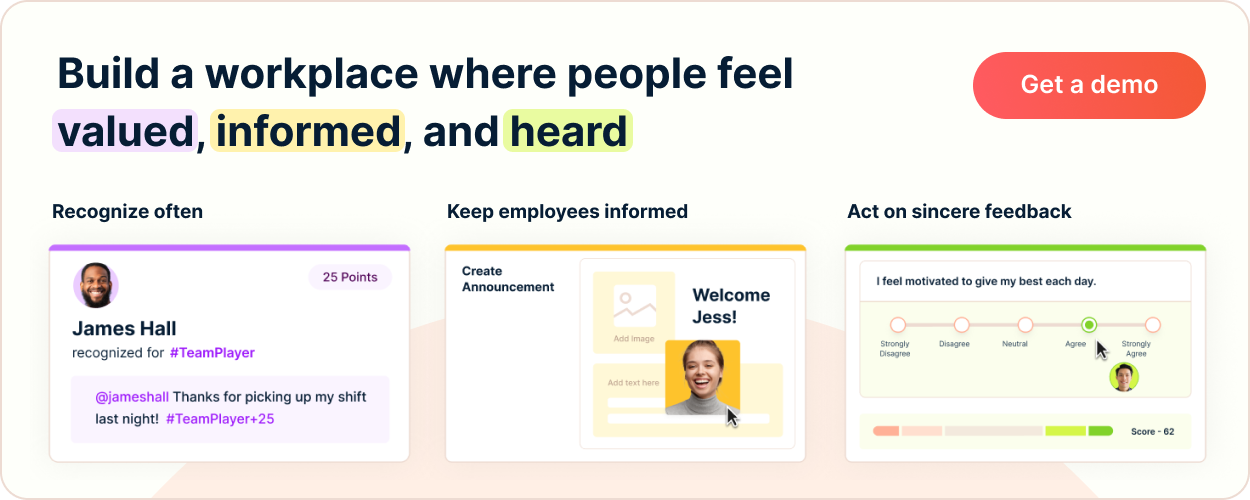Your Employees Feel Overlooked, And That’s A Leadership Problem

What does it mean to feel invisible at work?
In August 2024, a Wells Fargo employee died at her desk in Arizona, and no one noticed for four days. Her absence didn't raise alarms. No one checked in. The people around her carried on with their routines until the smell led to a heartbreaking discovery.
That same month, during a company hiking retreat in Colorado, a worker was accidentally left behind on a mountain after the team descended without him. Disoriented and alone, he spent the night on the mountain before being rescued.
These are extreme and tragic examples. But they reveal something deeper: the terrifying emotional weight of being forgotten, overlooked, or treated as replaceable. And while most stories don’t make the news, our research shows that this sense of invisibility is far more common than we’d like to admit.
So, what are the costs of having employees who feel this way? Companies that overlook their workers experience a decline in employee motivation, innovation, and work quality.
In this article, we’ll review the results of our survey of 1,000 full-time employees, 39% of whom report feeling like just another number at work. These employees feel faceless, undervalued, and unacknowledged. You’ll learn about the impact that feeling invisible has on your team and business. Additionally, we'll provide you with some simple tips and strategies to help your employees feel more valued and appreciated.
For the sake of clarity, in this article, we’ll refer to those who feel like a number as employees who “feel overlooked.” On the other end of the spectrum are the employees who “feel seen,” those who feel recognized for their contributions and connected to the people around them. The difference between these two experiences is stark, and the impact on engagement, morale, and retention is significant.
This is a leadership problem. And the consequences are far-reaching.
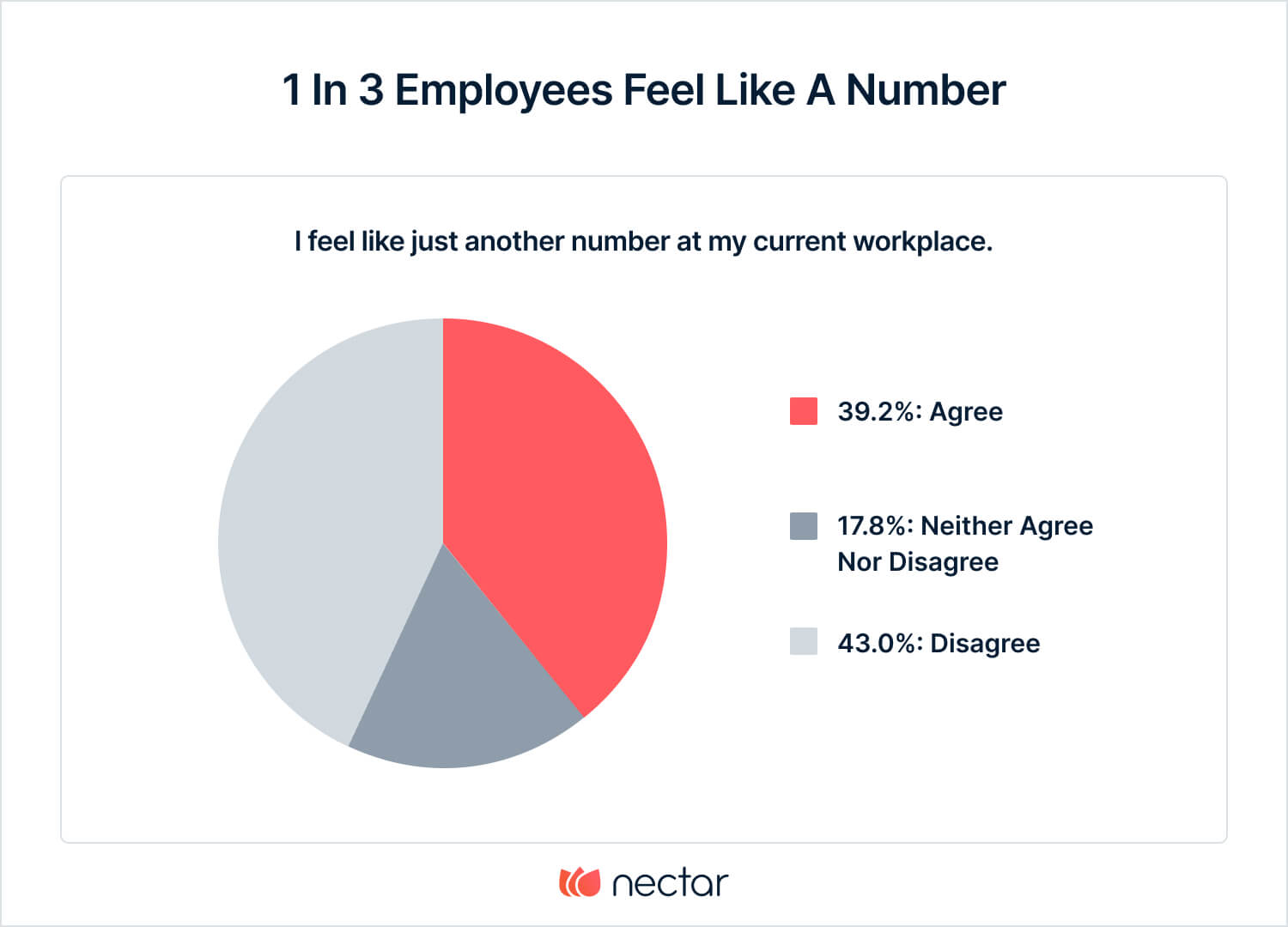
What Does Invisibility Feel Like Day To Day?
We’ve discussed extreme examples of invisibility in the workplace, but what does daily life look like for employees who feel overlooked? Employees in this group feel like their:
- Individual accomplishments aren't significant.
- Colleagues wouldn’t care if they took an extended break.
- Meeting contributions aren’t heard.
- Managers lack the ability to motivate them.
Individual Contributions Are Traded For Team Accomplishments
When employees feel overlooked, they feel like their personal contributions are undervalued.
Often, their contributions are overshadowed by a focus on team achievements or impersonal metrics. Several employees in our survey group requested more “direct feedback and recognition regarding accomplishments when it comes to work and the impact I have.”
Team accomplishments are great, but it’s also important to recognize individuals, too.
Unfortunately, when employees feel overlooked, there’s a strong workforce sentiment that leaders don't appreciate employees for what they bring to the table individually.
- 81% of employees believe their company cares more about numbers than people
- 67% of employees feel their input rarely influences decisions that affect their work
- 65% report that their unique contributions are dismissed in favor of celebrating team accomplishments
- 67% of people believe their career aspirations are disregarded in their roles and assignments
- 59% say they have to act like everyone else at work, hinting that their individuality isn’t welcome
In comparison, 8% to 12% of employees who feel seen agreed with these statements.
When employees feel their individuality and personal motivations are ignored, it makes them feel more like a number than a valued team member, which leads to disengagement and frustration.
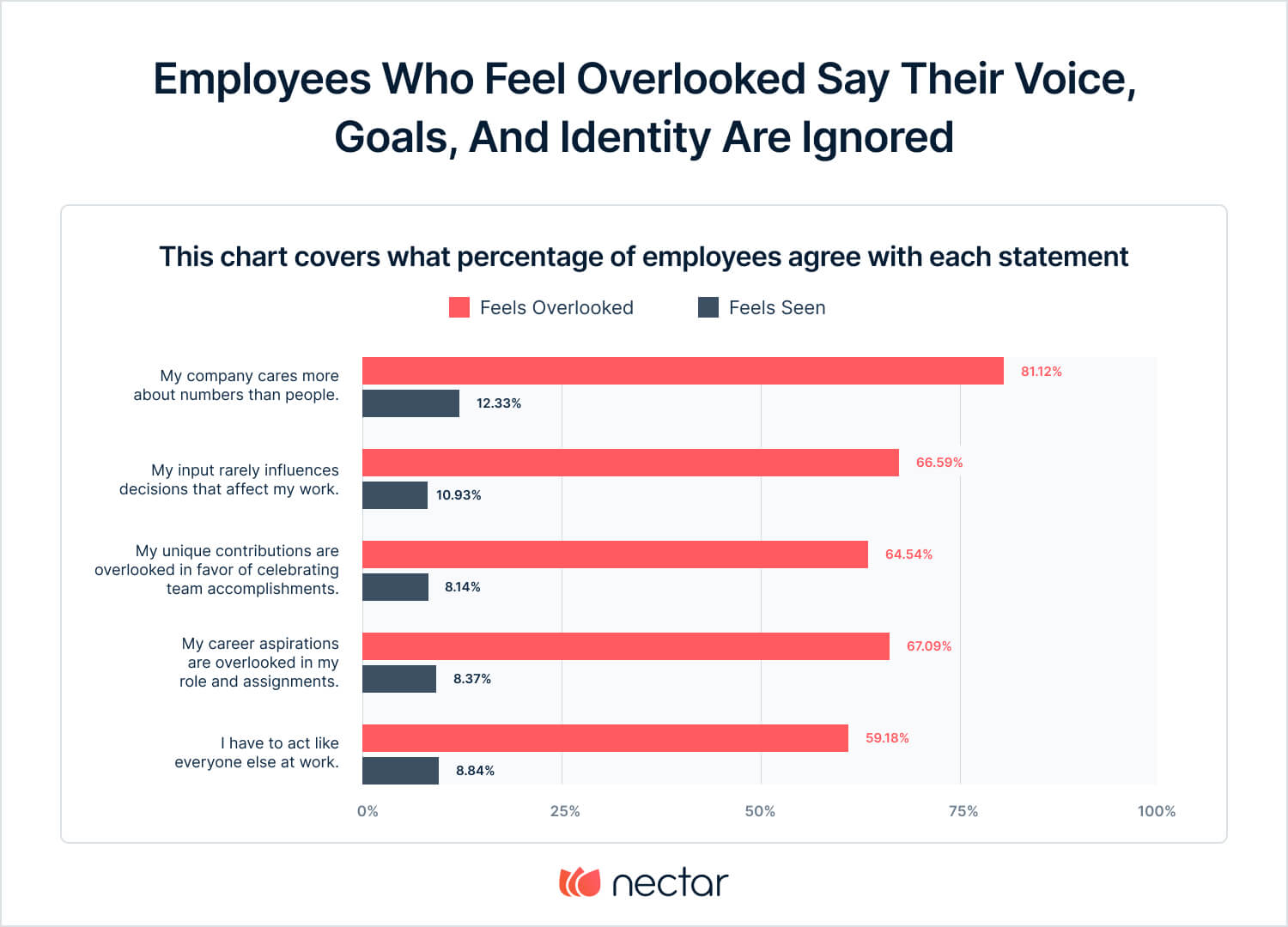
Covering Work Is Put Above Caring for Colleagues
Calling in sick is a big decision for many employees, who may worry about letting their colleagues down or missing out on advancement opportunities. However, the stark reality for employees who feel overlooked is that people may not even notice their absence.
When we asked employees how their team members would respond if they were out sick for a week, 37% of employees who feel overlooked said their peers would just ensure their work was covered. Another 15% of these employees said they don't believe their colleagues would notice their absence; they either wouldn't pick up on anything being different or would forget they worked there altogether.
In comparison, employees who feel seen have a much more positive spin on being out sick for a week:
- 51% of these employees say that their colleagues would notice their unique contributions were missing
- Another 31% say their colleagues would wonder where they were.
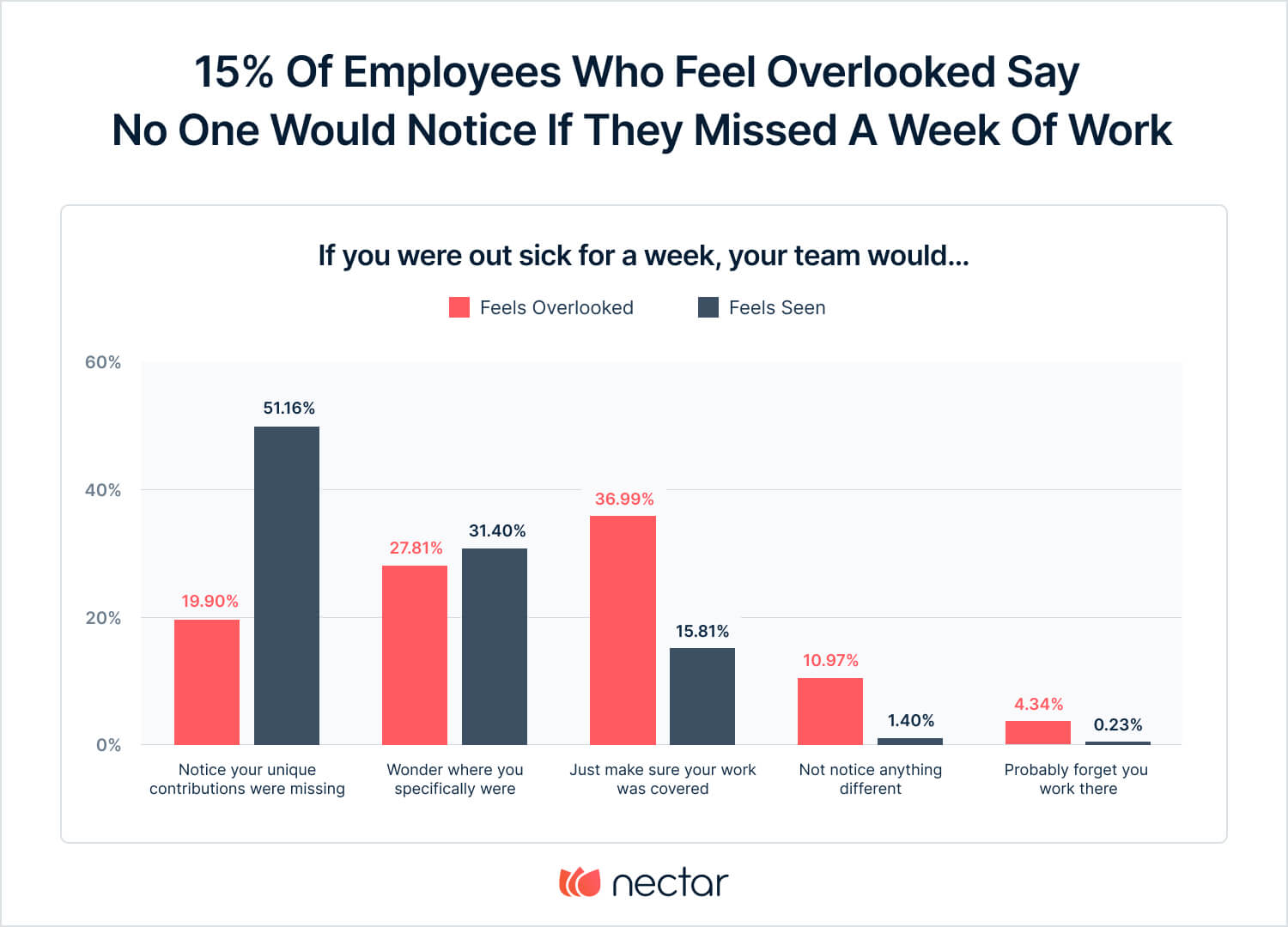
Feeling comfortable taking a sick week or a longer vacation is essential. Employee burnout is a huge concern that worsens when employees can't take time to recuperate. In a recent retention and turnover survey, we found that 63% of employees experiencing burnout plan to look for work in the next three months. If more employees were confident they would be missed when taking a break, they would feel comfortable requesting PTO or sick leave before they struggle with burnout.
Meetings Make Employees Feel Voiceless
Workplace meetings are another area where employees can feel entirely overlooked. Whether in virtual meetings where their faces are lost in a grid of other names or in face-to-face meetings with numerous contributors, employees can feel as though their meeting attendance is pointless.
When employees feel like numbers, their meeting experiences turn negative quickly. While 81% of employees who feel seen say people ask for their perspective in meetings, employees who feel overlooked have a worse time:
- 26% feel their voices are heard in meetings but not remembered
- 13% say their comments are attributed to someone else later
- 12% are talked over by other team members
- 27% have given up trying to share anything in the meetings they attend
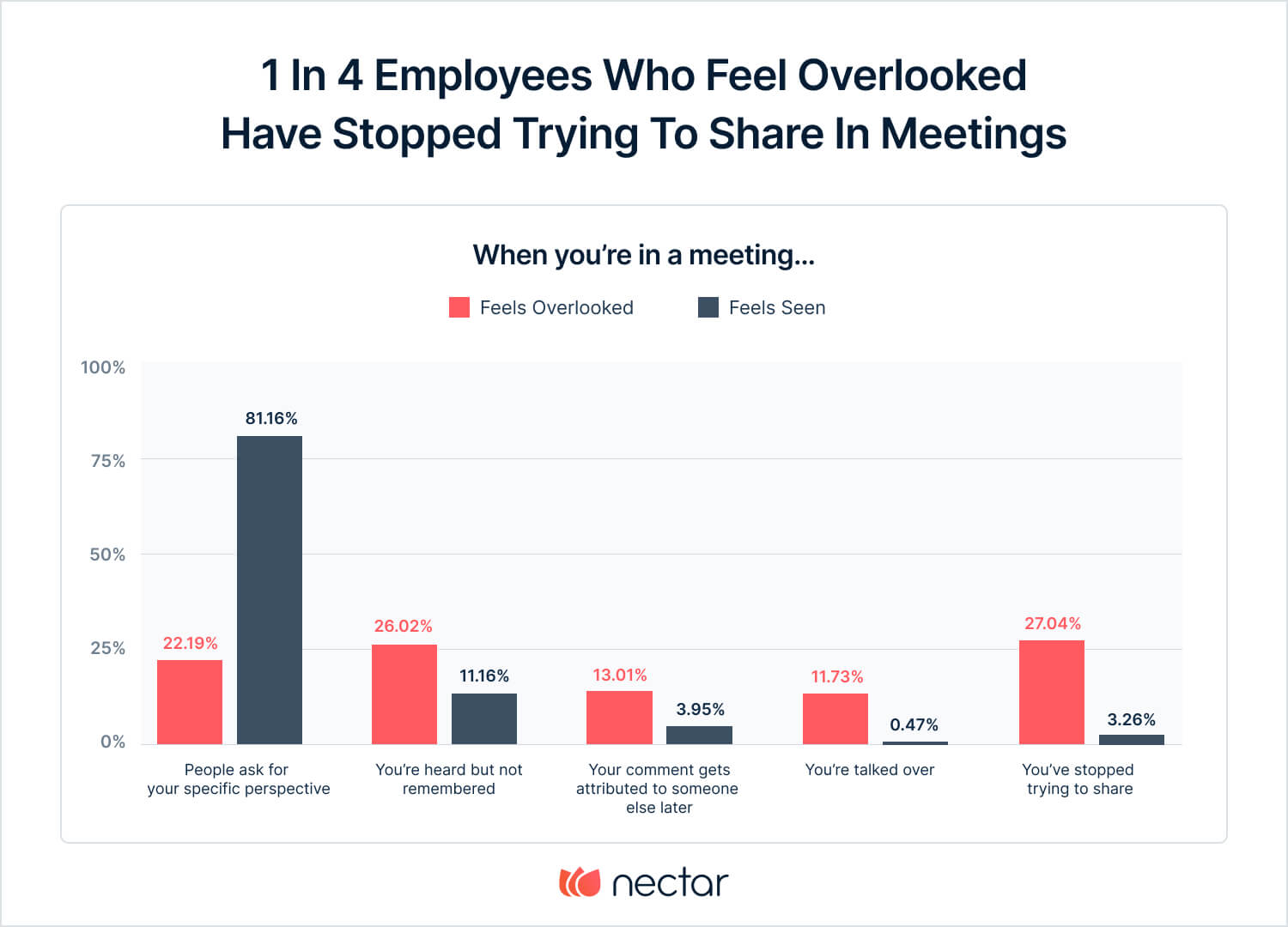
Are you missing out on a significant number of important voices at work? Employees who feel overlooked have important things to say, but over time, they have decided to keep their ideas to themselves. Psychological safety is a massive issue for employees who feel overlooked. Innovative companies require employees to feel safe sharing their opinions, and too often, overlooked employees have been subtly told theirs don’t matter.
Managers Fail To Motivate Employees
If we’ve learned anything from analyzing thousands of survey responses, it's that employees aren’t as intrinsically motivated as you think. There will always be outliers and employees who work hard simply because they want to, but external motivation is crucial.
A whopping 67% of employees who feel overlooked say their manager doesn’t know what uniquely motivates them. If employees aren’t motivated, productivity will slip. Organizations must invest in personalized employee motivation strategies to remain competitive in the market.
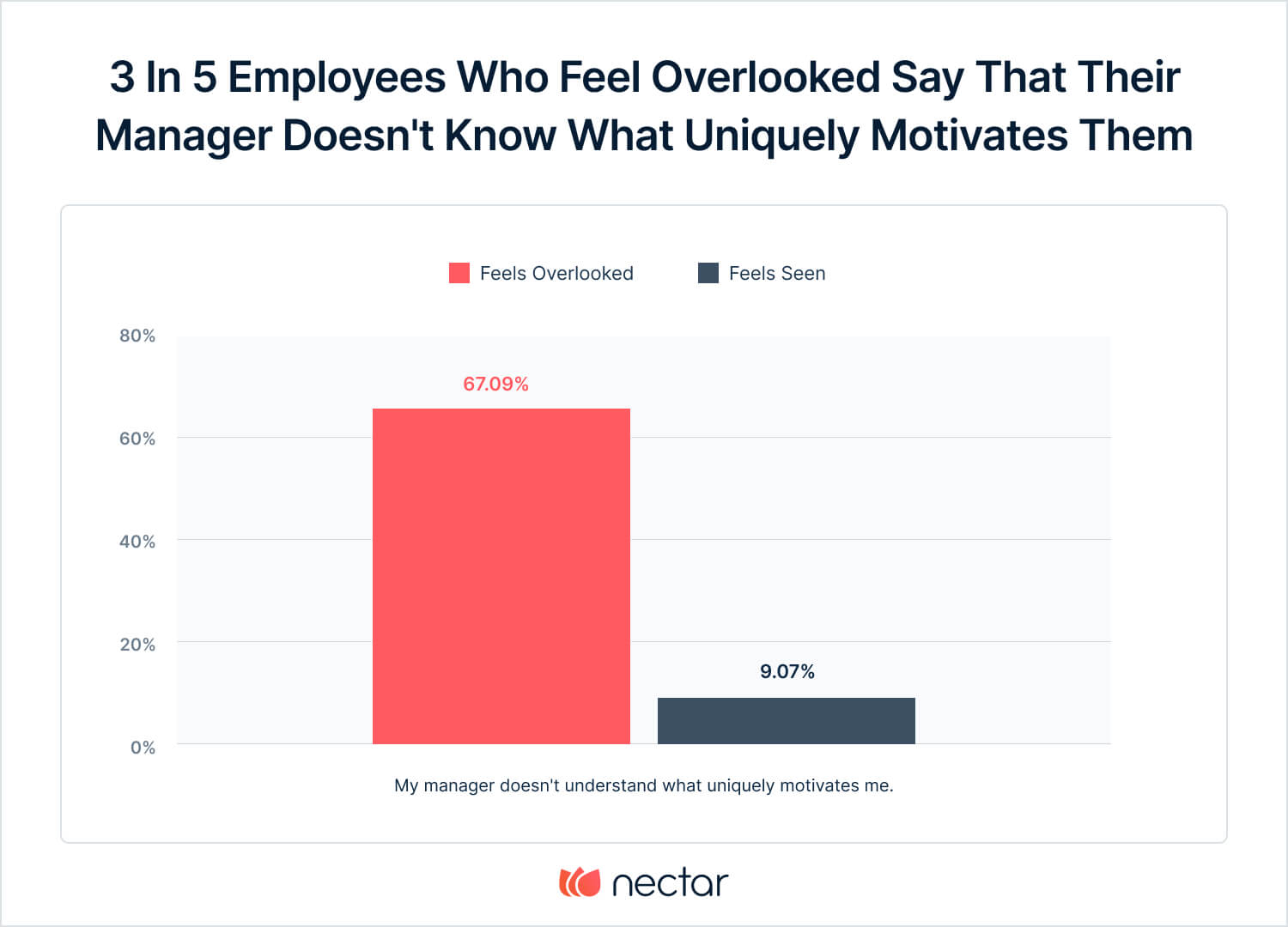
Employees Get Less Personalized Attention
As teams grow, it can be challenging to find time for one-on-one connections, but employees need these experiences to feel motivated and connected to the company. Leaders can focus on small moments to provide personalized attention to employees, such as birthdays, work anniversaries, or even holidays like Thanksgiving.
To understand this idea, we examined a unique scenario: how managers would react to an office birthday card. Nearly 53% of employees who feel seen say their manager would write something genuinely personal on their card. On the other hand, nearly 23% of employees who feel overlooked said their manager probably wouldn't write a card at all.
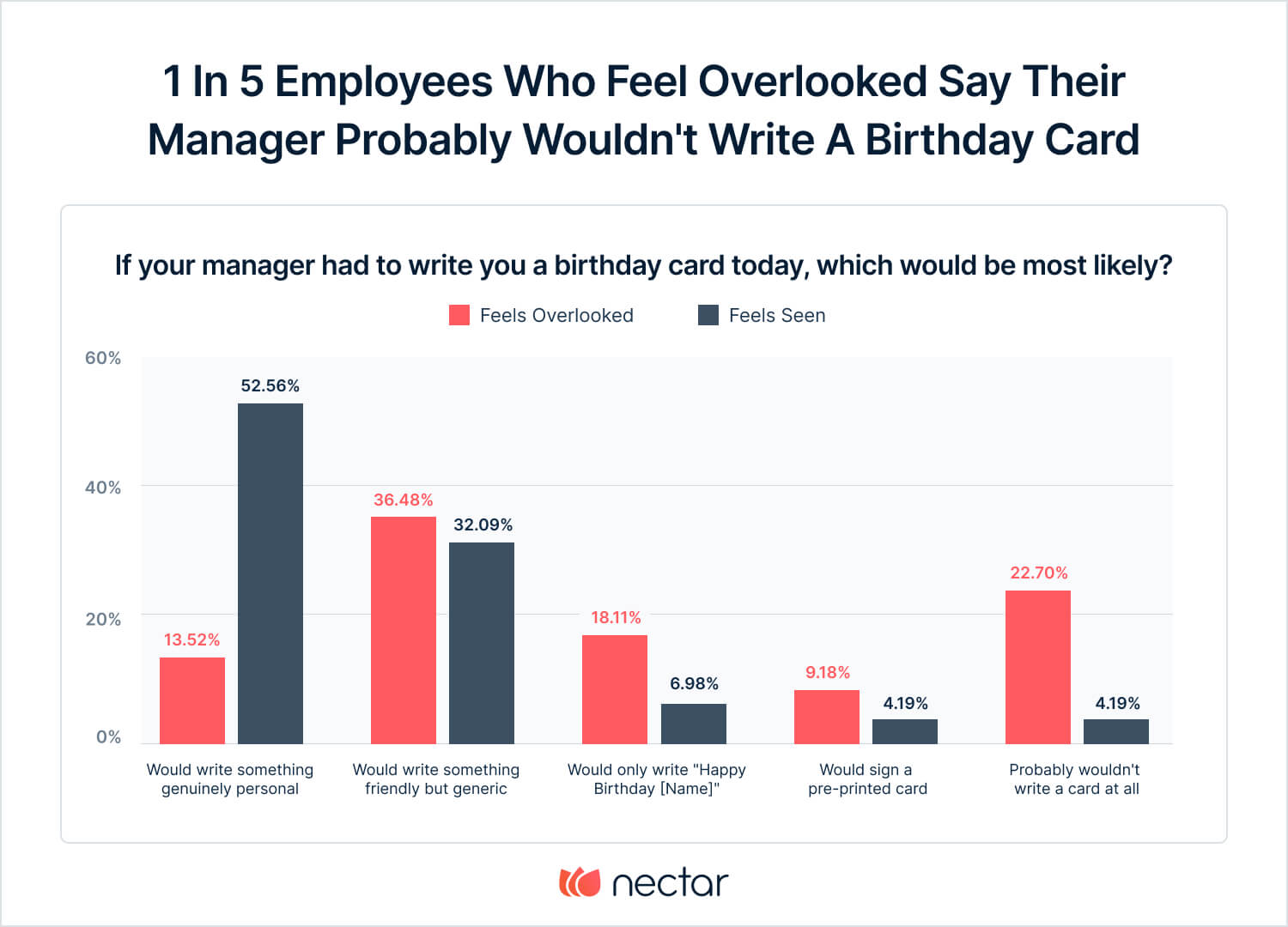
Feeling Overlooked Rarely Fades On Its Own
Once employees start feeling overlooked, that feeling tends to stick, and it often worsens. Among employees who already feel this way, 60% say the feeling has intensified over the past year, while another 37% say it hasn’t changed at all.
That means nearly everyone in this group is stuck in a cycle of invisibility.
These aren't passing frustrations or bad weeks. They're lasting perceptions that grow deeper over time unless something actively shifts. Without meaningful intervention from company leaders, these employees are unlikely to bounce back on their own.
The longer someone feels unseen, the harder it becomes to re-engage them. That's why addressing this issue must be intentional. Managers and leaders must go beyond surface-level gestures and rebuild trust through genuine, personal connections.
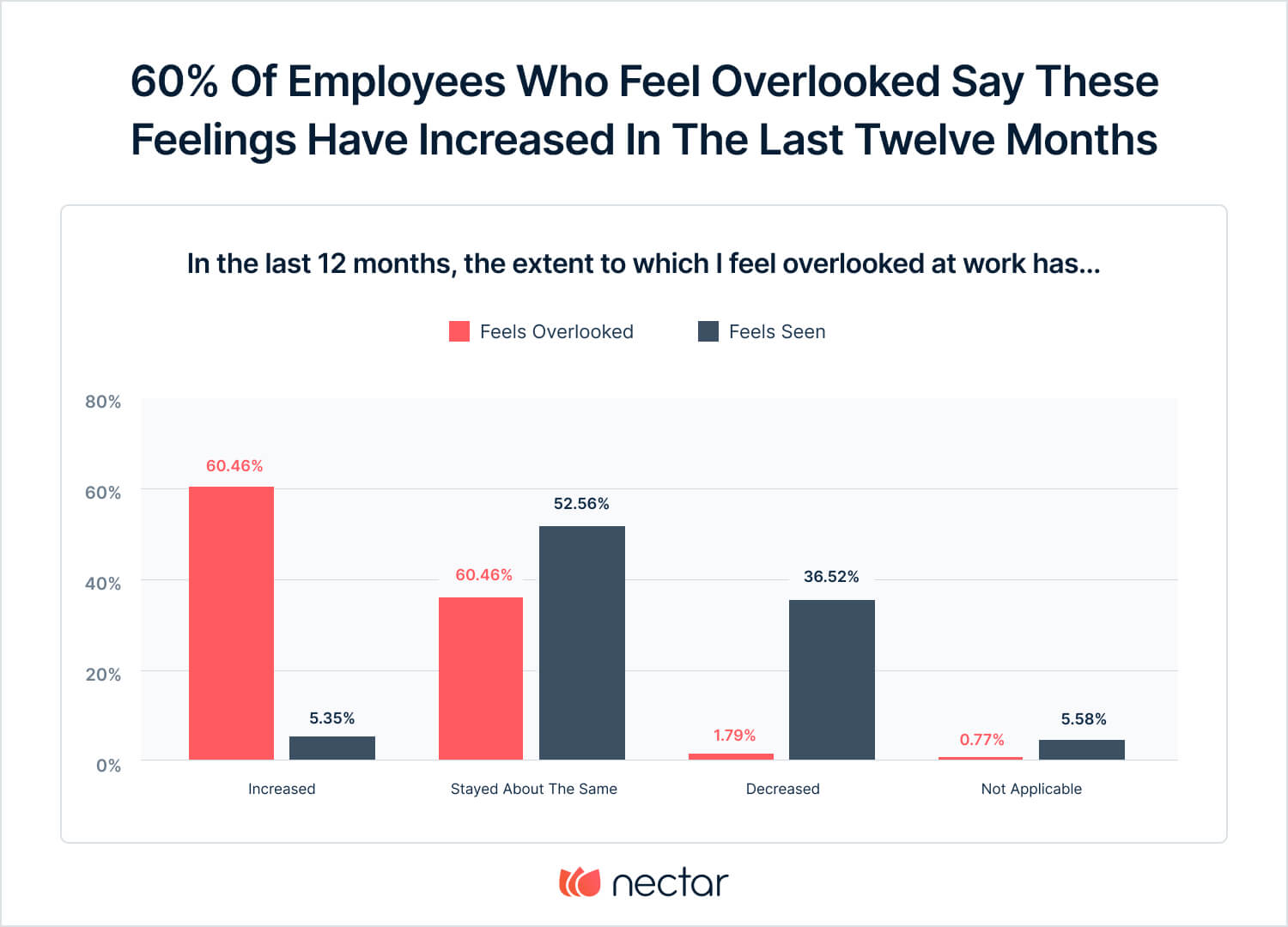
The Business Cost of Overlooking Employees
When employees feel overlooked, it's not just an emotional issue, it's a business one. Our data shows clear consequences tied to this experience, reported directly by employees who feel overlooked at work:
- 60% said it affects their motivation to go above and beyond
- 42.6% said it impacts the quality of their work
- 41.8% said it reduces their interest in taking on new projects
- 41.6% reported worsening mental health or higher stress levels
- 41.1% feel less willing to share new ideas
- 35.5% are less likely to stay at their company
- 24.5% said it affects their relationships with coworkers
Only 7.6% of these employees said that feeling overlooked doesn't impact their work at all.
This data is a clear warning: most employees don’t quietly endure disengagement, they disengage outwardly. They disconnect from their work, their team, and their potential. And if your organization doesn't actively rebuild that connection, you risk losing more than just morale. You risk losing momentum, innovation, and top talent.
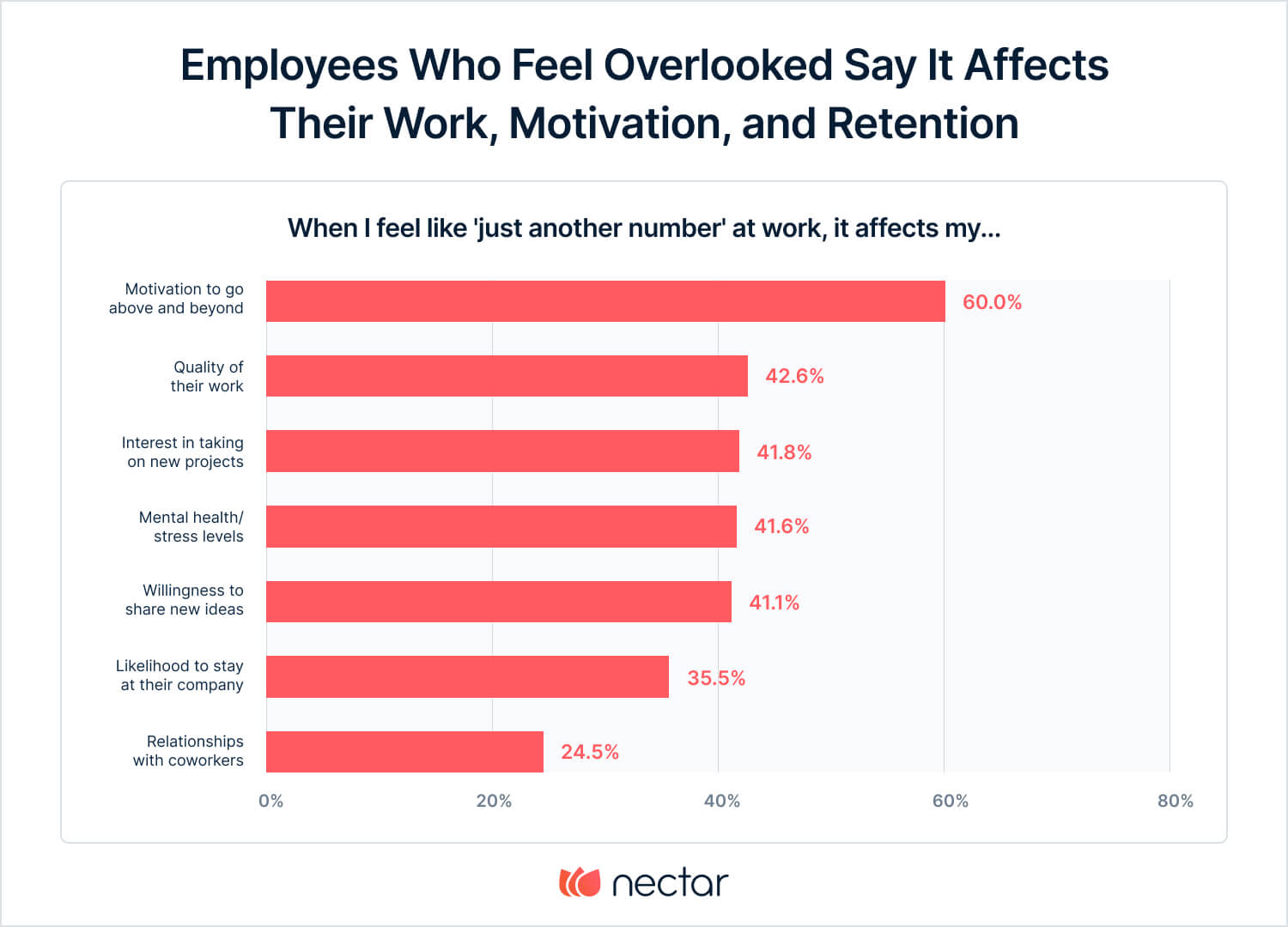
6 Ways Companies Can Create Workplaces Where Employees Feel Like People
Do you feel like you have a workplace where employees would be left behind on a hike? If so, it's time to decide to reverse course and build a company where employees are valued and appreciated at work. Get to know workers personally instead of thinking of employees as a collective that meets targets. You have nothing to lose and everything to gain by creating a workplace where employees feel like people.
1. Get Hands-On And Be Present
One employee summed it up best when considering their manager’s approach to leadership: “If they took the time to get hands-on and help out on the floor to see how hard some of us actually work, they’d start appreciating those of us that put in the effort.”
Leaders should take this insight to heart. When they walk the floor, join team meetings, and engage in day-to-day tasks, they stand in the shoes of the people working hard for the overall company. Like an episode of "Undercover Boss," leaders will come face-to-face with their employees' challenges and recognize the incredible efforts they make.
One worker suggested their manager might have more empathy if they were willing to get involved and shadow them because they said, “My manager has no clue what it’s like to do what I do.”
2. Actively Listen To Employee Suggestions
Employees want to contribute meaningfully, but often feel like their ideas are dismissed. They answer surveys, provide honest feedback in one-on-one meetings, and speak up in team meetings to raise concerns. But too often, their insights and opinions aren't followed up on. One worker explains that being heard would elevate their employee experience:
“It would make me feel more involved, like I'm part of the team and have an importance in the company.”
To actively invite and respond to employee feedback, companies should:
- Create structured feedback loops where employee suggestions are reviewed and implemented
- Follow up on ideas that can't be acted on immediately to show employees they've been genuinely considered
- Acknowledge contributions publicly, clarifying how employee input influences decision-making
As author Frank Sonnenberg shares, “The only thing worse than not requesting feedback is not acting on it. When you do nothing, nothing happens.”
3. Implement Personalized And Frequent Recognition
Recognition has a huge impact on employees, but those who feel overlooked don't get enough of it. Thirty-two percent of overlooked workers report never receiving employee recognition. Meanwhile, 63% of employees who feel seen get praise at least monthly.
Recognition doesn't always have to be about lavish award ceremonies and weighty cash bonuses. A simple acknowledgment can make a world of difference, as several survey respondents affirm:
“Just saying, ‘Hey, you’re doing a good job, keep it up,’ would make me smile and make me want to continue doing more and better at work.”
“I would like my manager and company as a whole to put more of an emphasis on employee appreciation. Certain benefits such as pay raises and gestures of appreciation would make employees feel better and more valued.”
“I wish my manager would not only thank me for my work but tell me what is good about it and say that I've done well. It would keep me motivated and would push me to go above & beyond my normal approach.”
To improve recognition:
- Train managers to give specific, personalized praise rather than generic compliments
- Encourage peer recognition programs, where colleagues celebrate each other’s contributions
- Implement real-time feedback tools that allow employees to receive recognition in the moment and connect the praise directly to their performance
As Nectar’s SVP of People & Culture, Cassidy Gonzalez, says, “Goals activate the plan. Recognition activates the person.”
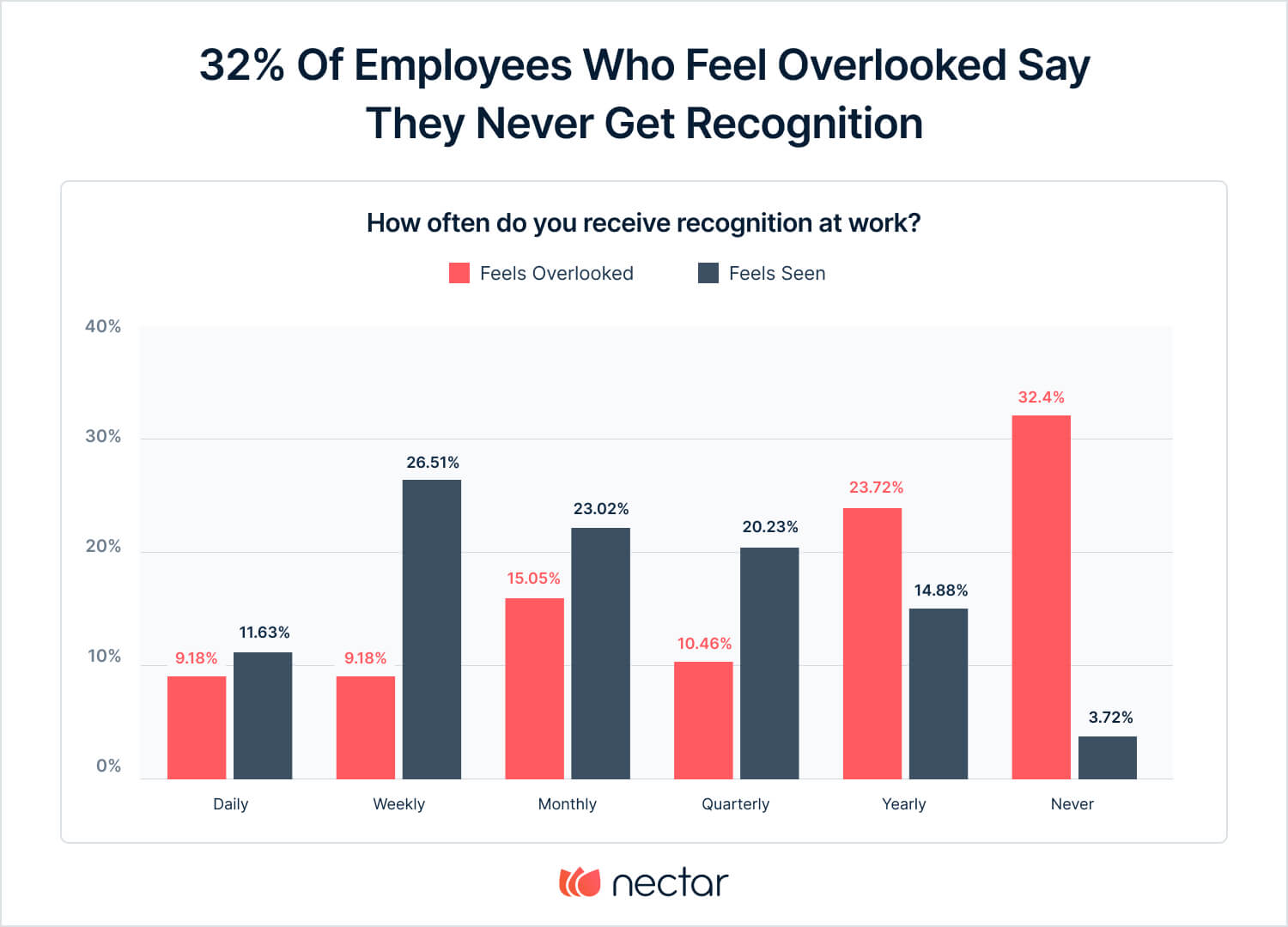
4. Offer Tangible Rewards For Hard Work
One way to reinforce simple verbal praise is by tying tangible rewards to employees’ efforts. As one person puts it, “I think occasional spot bonuses would be nice. This would let me know my work is appreciated and the extra hours I’m putting in are noticed.”
Consider:
- Implementing a points-based rewards system like Nectar, where employees can exchange their accumulated reward points for gift cards, products, company swag, or extra time off
- Providing unexpected perks, such as team lunches or surprise recognition events
- Customizing rewards to align with individual preferences, ensuring they feel personal and meaningful
5. Create Opportunities For Manager-Employee Relationships
Manager-employee relationships don’t materialize on their own. Leaders must be proactive in establishing a bond with their direct reports. The best managers are supportive and communicative. If your managers don't show these skills automatically, one way to address this gap is through frequent one-on-one conversations, where managers can ask questions like:
- What are your career aspirations in the next 12-18 months?
- What are your biggest challenges at work right now, and how can I help?
- How would you like to be recognized? (In public or in private? A note, a gift card, or something else?)
One employee recommended that managers “speak to us more frequently to gain knowledge of our day-to-day activities. This will boost morale and make us feel valued at work.”
The cadence of these check-ins depends on your specific company makeup and typical workday, but weekly one-on-ones are a best practice. The main point: Don't limit meaningful conversations to annual reviews. You'll foster stronger connections if you incorporate regular check-ins into your schedule. Managers with large teams might set up a monthly one-on-one meeting with their direct reports. They can also send a check-in email every Monday morning, asking, "What can I do to help you this week?"
6. Prioritize Work-Life Balance To Reduce Burnout
Employees feeling overworked is a growing concern, with research suggesting that 41% of employees are currently experiencing burnout at work. The expectation to take on extra responsibilities without proper recognition or support leaves many feeling invisible. Companies must prioritize well-being by:
- Encouraging reasonable workloads and ensuring employees aren’t stretched too thin
- Supporting flexible schedules that allow for a healthy work-life balance
- Checking in on employee stress levels and providing resources for mental health support
- Leading by example. For instance, managers could opt out of sending emails outside of working hours, reducing the expectation for anyone to reply during their rest time
The Bottom Line: Overlooked Employees Don't Drive Business, Engaged Ones Do
When employees feel seen, supported, and connected, they not only stay with the organization longer but also perform better. They take ownership. They bring ideas to the table. They help build the kind of culture people want to be part of.
But when people feel like just another number, the cost is real: motivation drops, innovation stalls, mental health declines, and turnover rises. You don't just lose individuals; you lose momentum.
If you want a resilient, high-performing organization, you have to start by treating employees like people, not parts.
The companies that recognize this will retain their talent, outperform their competitors, and shape the future of work.
The question is: Will yours be one of them?
Ready to take action? Click here to download a weekly calendar reminder to recognize your employees.
